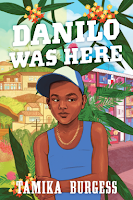January 21, 2025 by HarperCollins
E ARC provided by Edelweiss Plus
Danilo Osorio's life in the Chorillo neighborhood of Panama City, Panama, is very difficult in 1990. Operation Just Cause, the US military operation that targeted Manuel Noriega, the ruler of the country who was involved in drug operations, damaged Danilo's neighborhood very heavily in December of 1989, killing many of his neighbors, destroying homes and infrastructure, and damaging the apartment where his family lives. His father has gone to the US to find a job after a knee injury made it impossible for his to play baseball or work construction. Danilo's mother works night shifts at a super mercado, and he is in charge of taking care of his younger sister, Amara. He used to play baseball, but has no interest in it after his father's departure. It's not unusual for fathers to go to the US and never come back, but Danilo hopes this is not the case. When the We Care charity puts together a fun day for the local children, Danilo agrees to play in a baseball game with his best friend, Julian. He's surprised to see Coach Cox, a US baseball trainer who knew his dad, at the game, but when his Tio Beto insists on introducing Danilo, he finds out that the coach is interested in bringing Danilo to the US to attend his two month training camp. Danilo doesn't want to go, to his mother's chagrin, but things worsen quickly for the family. The Osorios' apartment building is condemned, as is his aunt and uncle's, which is especially bad since the aunt is expecting a baby. With nothing else to be done, everyone whittles down their possessions, stores a few things, and goes to live in an old airplane hangar that is divided up with curtains. There are two meals a day, but it's too far of a commute for the mother to get to work. Danilo realizes that it's better for everyone if he accepts the coach's offer. Soon, he is off to San Diego, living with the Anderson family, and attending the baseball camp. This is also difficult, since Mrs. Anderson thinks he doesn't speak English and is insensitive. It is nice to live in a big, comfortable house, but training is brutal. Danilo is the only Black player, and most of the team ignore him. Brian, who is a friend of Christina Anderson's, is nice to him. While he tries his best, Danilo is still suffering from having lived through the invasion, a fact that is pointed out to him by the teacher of Grayson Anderson's music therapy class. Grayson is on the autism spectrum, and has trouble accepting Danilo's presence in the house, although the two start to connect over a shared love of the accordion. Danilo is determined to find his father, and after confiding in Christina, learns that he lives about an hour away. Christian and Brian are helpful, but things are still difficult. After a less than optimal meeting with his father, Danilo has to decide whether to continue on at the baseball camp after the first two months, or to return to his family in Panama.
Strengths: Burgess' Sincerely Sicily is one of the only middle grade books I have seen with a Panamanian character, so I loved that this not only had a lot of history, but also involved baseball. I have a fair amount of students who have immigrated from a variety of locations, and I like to have stories for them and their peers that show an array of immigrant experiences to foster empathy. Gratz's Refugee is a title that many teachers like to use as a class title, but I liked this one even better. Danilo's life isn't easy, but he does what he needs to do in order to try to make things better. There are a few details about life in the 1990s, and some television shows and other pop cultural items are mentioned, as well as the very antiquated conceoot of writing letters and mailing them. I think my students will pick this up because of the bright cover, and be pleased with the contents.
Weaknesses: 1990 was my first year of teaching, and I don't remember seeing any students diagnosed on the autism spectrum until about 2005, although perhaps California was more aware of the issue. I would not have minded a short note at the end about the history of Panama, because most of my students won't have any background knowledge about this era.
What I really think: It's always good to see books that deal with different points of history. This is a great choice for readers who like their history mixed with a little bit of sports. It reminded me a little of Corbett's Free Baseball (2006) or Volponi's Game Seven (2015), but both of those involved Cuban ball players. Reading this might encourage students to find out more about Rod Carew and other Panamanian players!
Weaknesses: 1990 was my first year of teaching, and I don't remember seeing any students diagnosed on the autism spectrum until about 2005, although perhaps California was more aware of the issue. I would not have minded a short note at the end about the history of Panama, because most of my students won't have any background knowledge about this era.
What I really think: It's always good to see books that deal with different points of history. This is a great choice for readers who like their history mixed with a little bit of sports. It reminded me a little of Corbett's Free Baseball (2006) or Volponi's Game Seven (2015), but both of those involved Cuban ball players. Reading this might encourage students to find out more about Rod Carew and other Panamanian players!



























No comments:
Post a Comment